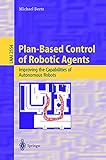Plan-Based Control of Robotic Agents [electronic resource] : Improving the Capabilities of Autonomous Robots /
Material type: TextSeries: Lecture Notes in Artificial Intelligence ; 2554Publisher: Berlin, Heidelberg : Springer Berlin Heidelberg : Imprint: Springer, 2002Edition: 1st ed. 2002Description: XI, 194 p. online resourceContent type:
TextSeries: Lecture Notes in Artificial Intelligence ; 2554Publisher: Berlin, Heidelberg : Springer Berlin Heidelberg : Imprint: Springer, 2002Edition: 1st ed. 2002Description: XI, 194 p. online resourceContent type: - text
- computer
- online resource
- 9783540363811
- 629.8 23
- TJ212-225
- TJ210.2-211.495
Overview of the Control System -- Plan Representation for Robotic Agents -- Probabilistic Hybrid Action Models -- Learning Structured Reactive Navigation Plans -- Plan-Based Robotic Agents -- Conclusions.
Robotic agents, such as autonomous office couriers or robot tourguides, must be both reliable and efficient. Thus, they have to flexibly interleave their tasks, exploit opportunities, quickly plan their course of action, and, if necessary, revise their intended activities. This book makes three major contributions to improving the capabilities of robotic agents: - first, a plan representation method is introduced which allows for specifying flexible and reliable behavior - second, probabilistic hybrid action models are presented as a realistic causal model for predicting the behavior generated by modern concurrent percept-driven robot plans - third, the system XFRMLEARN capable of learning structured symbolic navigation plans is described in detail.


There are no comments on this title.